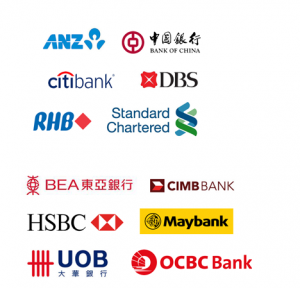Singapore’s largest bank, DBS, said that mortgage market may get a temporary boost in July from the last minute rush to buy properties before the new property cooling measures set in.
Barely an hour after the Government announced the new property cooling measures which kicked-in from 6 July, home buyers thronged several developers’ hastily launched property sales. Videos uploaded on social media showed prospective buyers’ frenzy at launches like Park Colonial show suites and Riverfront Residences. Thousands continued to swarm the show-suites well past midnight to put down an option fee for units of their choice before the deadline.
Property market observers suggest that over 1,000 units must have been snapped with buyers putting up an option fee before the deadline kicked-in. International Property Advisor Ku Swee Yong said it remains to be seen how many of these buyers will exercise or get bank loans approved.
Putting down an option fee indicates an Option To Purchase (OTP). This is usually 1 per cent of the purchase price. The OTP allows the prospective home buyer to reserve the unit exclusively for the buyer for a short period of time (usually 2 weeks). The option fee will be forfeited if the buyer does not exercise the OTP before the end of that period.
https://www.icompareloan.com/resources/new-property-cooling/
According to DBS’s Singapore country head Sim S Lim, “These people who bought 1,000 units will be looking for mortgage financing,” and that will cause a slight ramp-up in the mortgage market in the next one or two months.
But the mortgage market is expected to slow down after this.
Table of Contents
Sales of private residential properties are expected to stall as soon as the measures become effective as buyers step back to evaluate the financial implications and developers reassess pricing strategies. Stakeholders suggest that the private residential market may only start to see some signs of activity in September after the lunar seventh month. Even then, they expect sales volume to stay subdued unless developers adopt competitive marketing strategies.

Mr Lim holds similar views to the market observers and said: “After that demand has been satisfied, the mortgage market will cool, though discounts from property developers will mitigate the downturn.”
He said, the impact on DBS will also be cushioned by the nature of the bank’s customer base, which includes purchasers of government-subsidised housing and first-time buyers, he added.
The cooling measures announced on the 5th July and effective on and after 6th July 2018 is aimed squarely at the run-away price hikes due to the rampant en bloc sales of development, so there will be some impact on the new launch condo home loans.
Chief mortgage consultant at icompareloan.com said that, “the additional taxes such as Additional buyer stamp duties (ABSD) are not really helpful. The better way, is to SET a minimum liveable size of a condominium unit, this will greatly restrict the ability to reduce condominium unit size and raise per square feet price.”
He added: “Since HDB 3-room flats are around 700 Square feet, perhaps condominiums must be a minimum mandated size of 700 sq feet. With this suggested restriction, drastic taxation will not be required to cool the market.”
DBS reported having $73.5 billion of housing loans at the end of March. This is about 31 per cent (up 14 per cent from a year earlier) of the total Singapore mortgage market.
Singaporeans and Permanent Residents purchasing their first private properties are exempted from the additional buyers’ stamp duty (ABSD).
The following table describes Singapore’s Additional Buyers’ Stamp Duty (ABSD) rates for the different types of people and housing status:
|
Rates on or before 5 July 2018 |
Rates on or after 6 July 2018 |
|
|
SCs buying first residential property |
0% |
0% (No change) |
|
SCs buying second residential property |
7% |
12% (Revised) |
|
SCs buying third and subsequent residential property |
10% |
15% (Revised) |
|
SPRs buying first residential property |
5% |
5% (No change) |
|
SPRs buying second and subsequent residential property |
10% |
15% (Revised) |
|
Foreigners buying any residential property |
15% |
20% (Revised) |
|
Entities buying any residential property |
15% |
25% (Revised)# |
|
Plus additional 5% for developers^ (New, non-remittable)* |
Source: Monetary Authority of Singapore
Singaporeans and Permanent Residents purchasing their first private properties will however be affected by the new Loan-To-Value ratio (LTV) limit.
https://www.icompareloan.com/resources/new-launch-condo-home-loans-cooling/
Ku said: “The Loan-To-Value ratio limit will be dropped by 5 per cent, meaning we have to take out more equity upfront – more cash and more CPF upfront. And therefore buyers…will probably find it difficult to buy the large size unit that they want. They may have to trim down their expectations. In fact for some of these buyers they may then swing over to the HDB resale market, because the curbs are not put on to the HDB market at all.”
For Singaporeans and Singapore PRs buying second or third properties, the additional buyer stamp duty (ABSD) is hefty. Obviously this does not affect the new launch condo home loans as this is the ABSD portion. But it does make it difficult to buy and sell properties.
Foreigners will also be hit with the revised ABSD from 15 per cent to 20 per cent.
The hardest hit will be entities buying residential properties. These entities are typically Private equity firms set up to buy residential properties or such firms set up by the developers to mop up any unsold units from property development projects so as to meet the time-line to sell all the condominium units within a stipulated timeline to meet the qualifying certificate.
The ABSD for entities goes up from 15 er cent to 25 per cent. This could dampen some sentiment for the runaway en bloc redevelopment sentiment as there will be some slight cost increase for unsold units.
Ho said: “Ironically, developers could then build in more margin (pass off the cost to property buyers) at the early stages so that they can offload the unsold units to private equity firms and incur 25% ABSD. If all units are sold, then the 25% ABSD is remitted, but this does also mean that the developer has to find someone to buy up all the unsold units.”
If you are looking to buy properties, our Panel of Property agents and the mortgage consultants at icompareloan.com can help you with affordability assessment and a promotional home loan. The services of our mortgage loan experts are free. Our analysis will give best home loan seekers better ease of mind on interest rate volatility and repayments.
Just email our chief mortgage consultant, Paul Ho, with your name, email and phone number at paul@icompareloan.com for a free assessment.






